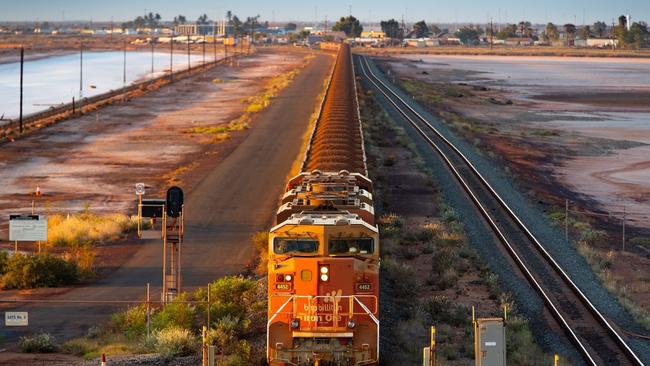BHP driver ‘stressed and sleeping with lights on’ when train crashed
Two white-tailed spider bites and sleeping with the lights switched on have been blamed for a train crash which sparked a major safety overhaul by BHP.

A BHP train driver was stressed, sleeping with the lights on and recovering from two separate white-tailed spider bites when he crashed into a stationary train at the mining giant’s iron ore operations, an investigation has found.
The low-speed crash happened in the early hours of the morning with the driver at fault experiencing a “degraded level of alertness, possibly associated with a microsleep”.
The Australian Transport Safety Bureau report into the incident said the driver hit a stationary train despite acknowledging four audible vigilance alerts. If the driver had not acknowledged them, brakes would have been applied automatically.
“The driver set their train in motion, and without the awareness of or memory of having done so, acknowledged four subsequent audible vigilance alerts which, by design, prevented a penalty brake activation prior to collision,” ATSB chief commissioner Angus Mitchell found.
“The driver reported that they were awoken by the collision, and thought they must have had a microsleep.”
The crash occurred at a speed of about 12km/h with no attempt made to brake or reduce speed before the crash, which propelled empty carriages forward about 40m.
The accident happened in March just weeks after BHP train drivers threatened to strike as part of their industrial campaign to secure an improved enterprise agreement.
The ATSB said the crash had sparked big changes at BHP, which moved to boost fatigue safeguards and reviewed vigilance systems on it locomotives.
“BHP reviewed the fatigue risk periods for their fly-in fly-out rail operations driver rosters, and increased the number of fatigue assessments during each rotation,” the bureau said.
“Fatigue assessments are now conducted on each of the first five night shifts and on the first and fourth day shifts of each rotation. These assessments are conducted face-to-face with the on-shift supervisor or co-ordinator at each depot location.”
The investigation found the driver involved in the crash suffered a white-tailed spider bite on his leg while staying at BHP-provided accommodation next to Port Hedland International Airport in November 2023 and received treatment after flying home to Sydney.
He suffered another bite, this time on his neck, after returning to work in January and again received treatment in Sydney.
BHP provided investigators with receipts confirming that the driver’s room and three adjacent rooms were fumigated on February 1, 2024.
“However, when the driver returned to their room 26 days later, they reported there were no obvious signs it had been fumigated as it did not appear to have been cleaned,” the ATSB report said.
“The driver reported that their sleep quality was affected as they woke often, including to spray the room, fearing they would be bitten again, and slept with the lights on to deter spiders.”



